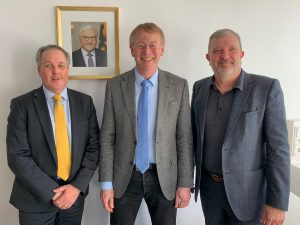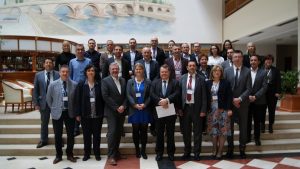New report identifies key components of authoritative geospatial data
Authoritative geospatial data is one of the basic building blocks for digital transformation and can be defined by seven characteristics that foster its trust across borders and between users, says a new report.
Researchers and practitioners in national mapping, cadastres and land registries (NMCAs) asked EuroGeographics, EuroSDR and KU Leuven what they believe makes their geospatial data authoritative. By identifying common characteristics, the aim was to gain a better and more comprehensive understanding of the definition, nature, governance and future of authoritative data and the links to spatial data quality in Europe. The research found that agreed rules of creation and use, a legal aspect, accountability, quality management, certification, traceability, and maintenance, were all recurring themes.
Report co-author Mick Cory, Secretary General and Executive Director of EuroGeographics which represents European NMCAs said: “Our members are recognised as the official sources of national geospatial information and whilst their data is routinely described as authoritative, it was not fully clear how the term is applied and interpreted across Europe.”
"Official, authoritative data is important because it supports a range of legal, fiscal, security and other public administrative purposes. For example, cadastral authorities and land registries fulfil an essential role providing official, detailed, secure and reliable information on property rights and registration.”
“In many countries, the process is enshrined in law with a public body given authority for the cadastral task. This makes the data authoritative according to our research which defines it as: Data that is provided by a public body (or authority) which has an official mandate to provide it, that is based on a set of criteria to ensure known quality, and that is required to be used and reused by the public sector and society as a whole.”
Mr Cory continued: “The importance of authoritative data has long been recognised at a national level and is increasingly recognised internationally, in particular in addressing the UN Sustainable Development Goals. Other sources can supplement, but not replace, official data of known quality and reliability.”
Co-author, Joep Crompvoets, KU Leuven and Secretary General of EuroSDR, which is the European Spatial Data Research network linking NMCAs with Research Institutes and Universities in Europe, added: “NMCAs told us that they valued being able to label their information as authoritative, not only because users give it greater credit but also because it helps secure government investment to ensure it is updated, supported and used by public services. They also underlined that there is a need for organisations within the public sector to take up a central role in the governance of authoritative data.”
“Our results demonstrate that there is a need for a systematic and harmonised approach towards authoritative data and that more effort should be put in making it available and recognisable by other public organisations as well as private actors.”
The full report is available here.
EuroGeographics is an international not-for-profit organisation (AISBL/ IVZW under Belgian Law. BCE registration: 833 607 112) and the membership association for the European National Mapping, Cadastral and Land Registry Authorities. It currently brings together members from 46 countries, covering the whole of geographical Europe.
EuroSDR is a not-for-profit organisation linking National Mapping and Cadastral Agencies with Research Institutes and Universities in Europe for the purpose of applied research in spatial data provision, management and delivery.
Find out more about EuroSDR.

 Colin Bray, President of EuroGeographics and Chief Executive of Ordnance Survey Ireland, and Mick Cory, Secretary General and Executive Director of EuroGeographics, visited Paul Becker, the Director General of BKG, the Federal Agency for Cartography and Geodesy for the German government.
Colin Bray, President of EuroGeographics and Chief Executive of Ordnance Survey Ireland, and Mick Cory, Secretary General and Executive Director of EuroGeographics, visited Paul Becker, the Director General of BKG, the Federal Agency for Cartography and Geodesy for the German government.